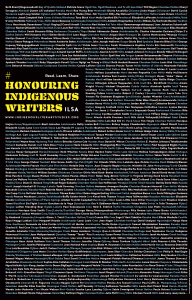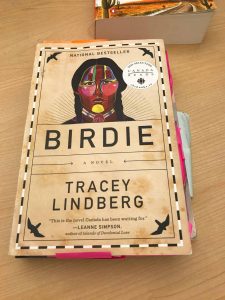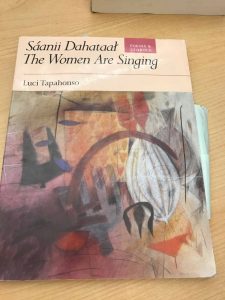Indigenous book recommendations
Great books and underrepresented authors to add to your list

There is not a lack of Indigenous authors, but rather they are underrepresented in popular culture. @justicedanielh, a professor at the University of British Columbia, tweets an Indigenous writer a day to debunk this myth. Full graphic available online. Graphic courtesy of Robin Mitchell Cranfield
By Sabrina Harmata, Staff Writer
Indigenous books often don’t get the recognition they deserve. It doesn’t help that Indigenous literature is already under-represented in major bookstores. Dr. Renae Watchman, a Navajo professor on the Mount Royal University campus, who specializes in global Indigenous literature, gave recommendations for books to read as well as some authors that should already be in the Canadian literature canon. She even suggested checking out #HonouringIndigenousWriters on Twitter.
In 2016, @justicedanielh, a professor at the University of British Columbia, tweeted an Indigenous writer a day using this hashtag to debunk the myth that there is a lack of Indigenous writers, instead calling out a lack of recognition. The diversity of authors on this list alone shows that even the Indigenous literature that is more recognized is severely limited, failing to capture a well-rounded picture of Indigeneity. Here are some Indigenous books and authors to check out before diving into the extensive list on Twitter:

Birdie, by Tracey Lindberg, centers around Bernice Meetos, a Cree woman, who is struggling to find herself after facing a tragic past. Birdie was selected for Canada Reads in 2016. Photo by Sabrina Harmata
Birdie by Tracey Lindberg
Tracey Lindberg is a Cree woman from the Kelly Lake Cree Nation in British Columbia who currently teaches Indigenous law at the University of Ottawa. Birdie, itself, was selected for Canada Reads in 2016. The novel centers around Bernice Meetos, a Cree woman, who is struggling to find herself after facing a tragic past. Ultimately, through a quest-like journey, Bernice is able to heal herself from past oppression and find her true identity as she returns to her Cree traditions. Birdie is an important story of self-discovery that sheds light on the significance of decolonization in finding one’s identity. Mixing humour and tragedy, Lindberg’s novel isn’t just educational, it’s relatable, too.
Voices of Fire by ku’ualoha ho’omanawanui
ku’ualoha ho’omanawanui is a Kanaka Maoli associate professor of Hawaiian literature at the University of Hawai’i. Voices of Fire: Reweaving the Literary Lei of Pele and Hi’iaka gives a historical account of the impact colonization had on Hawaiian culture. Looking specifically at traditional Kanaka Maoli stories (mo’olelo), songs (mele), chants (oli), and dances (hula), ho’omanawanui attempts to restore their oppressed, almost-lost culture. By examining the traditional Pele and Hi’iaka stories, ho’omanawanui actively participates in decolonizing her community. Dr. Watchman acknowledges that “[t]here’s more to Indigenous literature than just sitting around with a coffee and reading.” This book, being so politically charged, is a perfect example of how Indigenous literature requires more reflection than any other genre.
Winter in the Blood by James Welch
James Welch was a Blackfoot and A’aninin writer credited with starting the Native American Renaissance. Winter in the Blood takes place in Montana in the 1960s as an unnamed Blackfoot narrator searches for his identity while battling oppression. This search leads to an important discovery about his ancestry, one that turns out to be necessary in his quest for identity. Welch’s novel demonstrates the importance of knowing your past in order to find yourself. The book was also adapted into a movie in 2013, so once you’re done reading it, you can always check out the film.

The Women are Singing, a collection of poems by Luci Tapahonso, a Navajo poet, describe her home in Shiprock, New Mexico. She was the first poet laureate of the Navajo Nation. Photo by Sabrina Harmata
The Women Are Singing by Luci Tapahonso
Luci Tapahonso is a Navajo poet who was the first poet laureate of the Navajo Nation. Her book, The Women Are Singing, is a collection of poems and stories that describe her home in Shiprock, New Mexico and her experiences with the people there. Tapahonso highlights many significant aspects of Navajo life. She brings special attention to how connected and intertwined people’s lives are. What makes her book unique from the others on this list is that she not only writes in English, she uses Navajo as well.
Katherena Vermette
Katherena Vermette is a Métis poet, short-story and novel writer as well as a filmmaker. Her works include The Break, a poetry collection titled North End Love Songs and a sci-fi graphic novel titled Pemmican Wars. Her collection North End Love Songs won the Governor General’s Award for English-language poetry in 2013. She was even on MRU’s campus at the beginning of the fall semester showcasing the short documentary she made with Erika MacPherson. On top of her award-winning writing, Vermette is also an activist who works with marginalized youth, encouraging them to use writing as a coping mechanism.
Louise Erdrich
Louise Erdrich is an Anishinaabe writer and poet, who also writes children’s books. Her works have collected many awards including the Anisfield-Wolf Book Award, the National Book Award for Fiction and the Library of Congress Prize for American Fiction. Her most notable books are The Plague of Doves, Love Medicine and The Round House, but she has many more to choose from. Based on the number of awards she has accumulated, she’s definitely worth a try.
To get a more comprehensive view of Indigenous literature consult #HonouringIndigenousWriters on Twitter.


